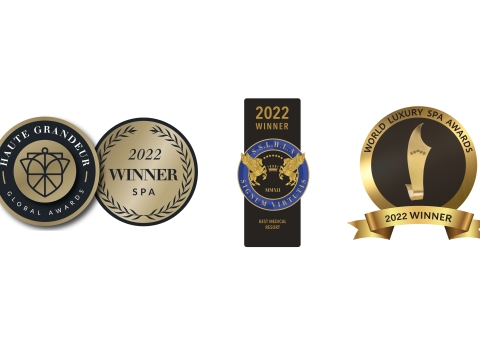Young and healthy with interval fasting
In recent years, a new trend has emerged in the nutrition sector: interval fasting. Dr. Harald Stossier, medical director at the VIVAMAYR Health Resort Maria Wörth in Carinthia, tells us what it can do, who it is suitable for and how it can keep you healthy inside and out and even make you look and feel younger
Fasting: an important companion of human culture since ancient times
No matter which culture we observe, fasting is an integral component of all world religions: be it Ramadan in Islam, the daily fasting after noon in Buddhism, or the period of fasting between Ash Wednesday and Easter in Christianity. The Jewish calendar is also characterized by numerous days of fasting (Yom Kippur and many others), and fasting also plays an important role in Hinduism. Deliberate breaks from eating are intended to make it easier for practitioners to focus on their faith and be more receptive to higher vibrations. This is also the reason why, for example, Buddhist monks and nuns generally consume less, since it facilitates meditation and the path to inner peace and enlightenment.
People now seem to have acquired a taste for fasting. More and more areas of life are being divided into or performed in intervals. This allows for greater efficiency, and brings us demonstrably closer to being the best version of ourselves. It has now been scientifically proven that interval training in sports has great benefits and that targeted breaks in eating, as in interval fasting, have a positive effect on the body.
These periods of fasting rev up “autophagy” within the body. Japanese cell biologist Yoshinori Ohsumi was awarded the Nobel Prize in Medicine in 2016 for its discovery. “Autophagy is a fundamental process, a genetic program within us that is constantly taking place and that is most heavily stimulated by fasting. The body basically carries out an internal clean, and cleanses itself. As a result, valuable substances can be retained in the body and made available for other important metabolic processes”, explains Dr. Harald Stossier, general physician and Mayr doctor at the VIVAMAYR Health Resort Maria Wörth in Carinthia. How exactly does this mechanism work?

Autophagy: the body’s own recycling process based on deliberate fasting
As a general principle, autophagy takes place continually in the body – the only question being how effectively. “There isn’t just one kind of autophagy that can be flicked on like a light switch”, Dr. Stossier points out, with reference to the mechanism’s complexity. “Autophagy is an ongoing process that is ramped up by fasting. The longer the fast lasts, the more effectively autophagy occurs in the body’s tissues and organs.” A great deal more research is required about the optimum fasting period and the degree to which this depends on the specific individual. At present, the generally accepted guidelines recommend 16-hour windows of fasting, and eight hours in which food may be consumed. However, it is also possible to extend the interval to 18 or even 20 hours, although only two meals should then be consumed per day.
This is why the method that tends to be easiest to integrate into daily life is the 16:8 method. For example, this method allows for breakfast at eight o’clock in the morning, lunch at midday and a last meal shortly before four in the afternoon. Of course, in principle, it is also possible to invert the process and eat your main meal in the evening.
However, Dr. Stossier advises against doing this, “It’s best to avoid this approach, because it doesn’t do you any favors! The body’s processes follow the natural rhythm of the day: not only does the sun rise in the morning, but this is also when our body boots up for the day. Following a night’s sleep, the digestive organs have the most energy in the morning, and therefore work at their most effective. This is why you should eat breakfast like a king, lunch like a prince and dinner like a pauper. By doing so, you support both your digestive system and the body’s own recycling process.” In turn, this has a positive impact on your well-being and your overall health.

How autophagy works in our body
The word autophagy is derived from the Greek words “autos” for “self” and “phagein” for “to eat”. In the strict sense of the word, therefore, it means “to eat oneself”. It is not quite that extreme, but this description illustrates very well what the process is actually all about: using defective cells to benefit important metabolic processes as well as self-cleansing and regeneration.
As is the case anywhere that work takes place, mistakes can also occur in cells. For example, the composition of amino acids can go wrong or mitochondria, our cells’ powerhouses, can develop incorrectly and produce substances that are damaging to our health. Our lifestyle is crucial in determining how often or how blatantly such mistakes occur. On the one hand, our body has a considerably high tolerance limit and can compensate for a lot. On the other, it is also equipped with an outstanding repair mechanism. For example, it is able to restore defective cells with the help of certain nutrients.
Sometimes, however, the body is not (or no longer) capable of repairing defective cell components, and the cell has to be disposed of. The cell recognizes this and grows a vesicle around the erroneous growth; this bubble is known as the autophagosome. You can imagine this as a sort of trash bag with which the cell is transported to the cell’s own “recycling facility”, the lysosome. There, the defective cell is broken down into its individual components and recycled. Components that are used to produce energy can be used for this purpose. In addition, the cell is completely regenerated, which effectively counteracts premature aging. “Autophagy is therefore our body’s own fountain of youth. A mechanism that we can consciously influence and utilize for our own benefit at any time”, Dr. Stossier summarizes.

Interval fasting is on trend – but autophagy always happens anyway
“People often need a catchy slogan in order to try something out or integrate it into their daily lives. And the same applies to interval fasting now. It’s gained such popularity because it’s something new”, Dr. Stossier is convinced. Moreover, it fits very nicely with the spirit of our times, which is characterized by efficiency and self-optimization, and is generally suitable for everyone. With this in mind, interval fasting came at just the right time. Autophagy, on the other hand, couldn’t care less about the reasons for your periods of fasting. It takes place in our body whenever there is no supply of new nutrients and the short and medium-term energy stores, such as glycogen in the muscles and the liver, have been used up. This is when our body ramps up autophagy, only interrupting it when we consume food again. Even a sip of orange juice is enough to stop the recycling program. The body always focusses on utilizing fresh food.
Fasting as a medical therapy
Fasting has many health-promoting effects: it regulates insulin levels, protects the cardiovascular system, inhibits inflammation processes, protects muscles and the nervous system, and improves the metabolism. It encourages regeneration of the entire body, which can mitigate or even completely eliminate typical diseases of civilization, such as high blood pressure, diabetes and cardiovascular diseases, or help to prevent them in the first place. This is the reason why fasting is also used as a medical therapy today. The VIVAMAYR Health Concept, which was established by Dr. Harald Stossier, adopts this exact approach.
“On the basis of individual diagnostics and therapy, we implement fasting as a supporting, health-promoting measure in all of our programs, in order to fundamentally foster the health of the individual as a whole. As a result, the digestive system is brought into harmony, and the immune system is also strengthened”, Dr. Stossier explains.
The VIVAMAYR philosophy stems from the founder of Modern Mayr Medicine, Dr. Franz Xaver Mayr (1875 to 1965). He dedicated his life to studying the connections between nutrition, digestion and health. Mayr realized that fasting not only improved the body’s form and condition and thus also the digestive system’s function, but actually made people healthier as a whole. These insights are reflected in all the VIVAMAYR programs, whether it be the Classic, Active Detox, Weight Care, Immune Boost, Stress Control or Anti-Inflammatory Skin treatment.

Interval fasting – or: living by the sun
Interval fasting seems to be a new buzzword for something that has, in fact, always been part of our human nature: living in harmony with nature as the basis of true health. “Fasting – carried out carefully and in line with your individual needs – can’t have any disadvantages. Rather, it’s about getting back in touch with your roots, i.e. the true rhythm of life”, Dr. Stossier reminds us. In the past, our life was characterized by times of more food and times of less. Food only became constantly available with the introduction of industrialization in the 20th century. This correlated with a drastic rise in health problems. “Get back in touch with the rhythm of nature! You’ll notice how much good it does you, and how your various complaints suddenly dissolve into thin air as if all by themselves. The better you adapt your lifestyle to the natural rhythm, the healthier you will be”, the health expert sums up.
Get your body’s own recycling in shipshape
At our VIVAMAYR Health Resorts, all our programs are carried out under medical supervision. By doing so, we ensure that the treatments are optimally tailored to your needs and are able to develop their full potential.
Not stayed with us yet? Inquire now! We look forward to accompanying you on your path to a healthier life.

Literature
Straubinger P. A., Fensl Margit, Karré Nathalie, 2019: Der Jungbrunnen-Effekt: Wie 16 Stunden FASTEN Ihr Leben verändert [The fountain of youth effect: how 16 hours of FASTING changes your life], Kneipp Verlag, Vienna
Stossier Harald, Prof. Dr. med., Stossier Georg, Dr. med., 2018: Moderne Mayr-Medizin & Das VIVAMAYR-Prinzip / Du bist, was du verdaust [Modern Mayr Medicine & the VIVAMAYR principle / You are what you digest], 1st edition, Verlagshaus der Ärzte GmbH, Vienna
Basting Horst, undated, Religiöses Fasten [Religious fasting], accessed on 10.3.2021, 10:47











